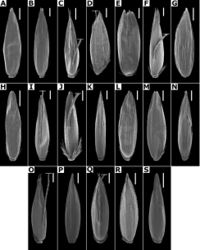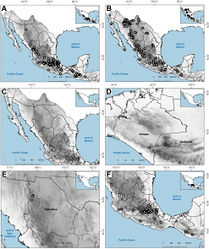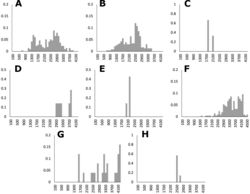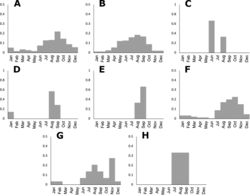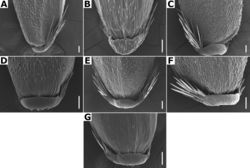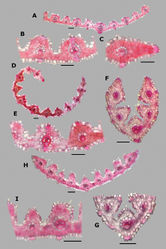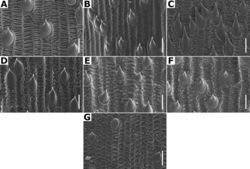Agrostis subrepens
| Notice: | This page is derived from the original publication listed below, whose author(s) should always be credited. Further contributors may edit and improve the content of this page and, consequently, need to be credited as well (see page history). Any assessment of factual correctness requires a careful review of the original article as well as of subsequent contributions.
If you are uncertain whether your planned contribution is correct or not, we suggest that you use the associated discussion page instead of editing the page directly. This page should be cited as follows (rationale):
Citation formats to copy and paste
BibTeX: @article{Vigosa-Mercado2023PhytoKeys230, RIS/ Endnote: TY - JOUR Wikipedia/ Citizendium: <ref name="Vigosa-Mercado2023PhytoKeys230">{{Citation See also the citation download page at the journal. |
Ordo: Poales
Familia: Poaceae
Genus: Agrostis
Name
Agrostis subrepens (Hitchc.) Hitchc., in Britton, N. Amer. Fl. 17(7): 525. 1937. – Wikispecies link – Pensoft Profile
- Agrostis hyemalis (Walter) Britton, Sterns & Poggenb. var. subrepens Hitchc., U.S.D.A. Bur. Pl. Industr. Bull. 68: 44. 1905. Type: Mexico. Chihuahua: in wet places, pine plains, base of Sierra Madre Mountains, 28 Sep 1887, C.G. Pringle 1420 (holotype: US (US00131756 [image!]); isotypes: F (F-104784 [image!], F-2108718 [image!]), K (K000308371 [image!]), NY (NY-327645 [image!], NY-327646 [image!], US (US00131757 [image!])).
Type
Based on Agrostis hyemalis (Walter) Britton, Sterns & Poggenb. var. subrepens Hitchc.
Description
Plants perennial, rhizomatous or developing pseudostolons. Tillers extravaginal, with cataphylls. Rhizomes and pseudostolons up to 5 cm long. Culms 0.6–1 m long, erect, decumbent at the base, nodes 2–4, glabrous, internodes glabrous. Leaves mostly cauline; sheaths 3.5–7 cm long, usually shorter than the internodes, glabrous; ligules 1–2 mm long, longer than wide, dorsally scaberulous, apices truncate, erose; blades 3–5 cm long, 1–1.5 mm wide, linear, flat or involute, scaberulous on both surfaces. Panicles 9–22 cm long, 5–10 cm wide, open, lax, pyramidal, long-exserted from the upper sheaths; branches spreading, rebranching about mid-length, scaberulous, without spikelets near their base, inferior branches 2–8 cm long; pedicels 1–3 mm long, ascending to spreading, scaberulous. Spikelets 1.8–2.8 mm long, purplish; glumes subequal, lanceolate, apices acute, 1-veined, scaberulous on the keel, lower glume 1.8–2.8 mm long, upper glume 1.7–2.7 mm long; callus glabrous or with a few trichomes, Inconspicuous; lemmas 1.3–2 mm long, elliptic, apices entire, acute, 5-veined, veins prominent, unawned; paleas absent; anthers 3, 1–1.3 mm long. Caryopsis ca. 1.2 mm long, elliptic; endosperm solid. 2n= unknown.
Anatomy and micromorphology
Leaf blades flat in transversal section; adaxial furrows deep, narrow; adaxial ribs square to triangular; keel absent; first order bundles circular in outline, sheath not interrupted, abaxial and adaxial sclerenchyma in strands; second order bundles circular in outline, sheath not interrupted, abaxial and adaxial sclerenchyma in strands; intercostal sclerenchyma absent; leaf margins with well-developed sclerenchyma caps, rounded; colorless cells absent (Fig. 31H, I). Lemmas with transversal thickenings irregular, wider than the unthickened portion of the wall; prickle hairs abundant (Fig. 32D).
Distribution and habitat
Agrostis subrepens was described from the Sierra Madre Occidental, in Chihuahua, Mexico (Fig. 26E). It has also been reported from South America, in Bolivia, Ecuador, Colombia, Paraguay, Perú and Venezuela (Soreng and Peterson 2003[1]; Idárraga-Piedrahita et al. 2011[2]), but the specimens from these countries were not seen, and could represent misidentifications of other species. In the study zone, A. subrepens grows in wet areas, in forests with Pinus and Quercus, between 2000–2168 m in elevation (Fig. 27E).
Phenology
Specimens with spikelets have been collected from August to September (Fig. 28E).
Commentaries
The status of A. subrepens as a distinct species and its distribution has been put in doubt recently (Sylvester et al. 2020a[3]). This species is very similar to A. perennans sensu lato and other awnless species of the study zone, but differs from them in the presence of pseudostolons, leaf blades with square to triangular adaxial ribs, and lemmas with irregular thickenings (vs. caespitose plants, leaf blades with rounded adaxial ribs, lemmas with usually polygonal thickenings). Some individuals of A. perennans sensu lato sometimes develop pseudostolons, but despite the leaf anatomy, there are few differences between the two taxa. We recognise A. subrepens as a distinct species, until more evidence is available.
It could also be confused with A. pallens from California and Baja California, but it is distinguished in the more open panicles, and unawned lemmas (vs. panicles often contracted, often awned lemmas), as well as the leaf anatomy.
Conservation status
Agrostis subrepens is known in the study zone from a few localities in Chihuahua, Mexico. It is represented by five collections, with no populations occurring in protected areas. The EOO is 74 km2 and the AOO is 12 km2. Following the IUCN criteria, the preliminary assessment category is Endangered (EN).
Specimens examined
Mexico. Chihuahua: Municipio Casas Grandes, Sierra Madre Occidental, W of Casas Grandes, just S of Hernández [30.04186415°N, 108.2901759°W], 2000 m alt., 18 Sep 1960, J. Reeder et al. 3535 (MEXU [*, **], US). Municipio Madera, Chuhuichupa, [29.60543842°N, 108.3736947°W, 2168 m alt.], Aug–Sep 1936, H. LeSueur 87 (US), 198 (US), near Colonia Garcia, in the Sierra Madre, [29.9833°N, 108.333°W, 2149 m alt.], 1 Aug 1899, E.W. Nelson 6195 (US).
Taxon Treatment
- Vigosa-Mercado, J; Delgado-Salinas, A; Alvarado Cárdenas, L; Eguiarte, L; 2023: Revision of the genus Agrostis (Poaceae, Pooideae, Poeae) in Megamexico PhytoKeys, 230: 157-256. doi
Images
|
Other References
- ↑ Soreng R, Peterson P (2003) Agrostis. In: Soreng R Peterson P Davidse G Judziewicz E Zuloaga F Filgueiras T Morrone O (Eds) Catalogue of New World Grasses (Poaceae): IV. Subfamily Pooideae.Contributions from the United States National Herbarium48: 42–89. https://archive.org/details/mobot39088011697067
- ↑ Idárraga-Piedrahita A, Ortiz R, Callejas-Posada R, Merello M (2011) Listado de las plantas vasculares del departamento de Antioquia. In: Flora de Antioquia: Catálogo de las Plantas Vasculares (Vol. 2) Universidad de Antioquia, Medellín, 127–923. https://www.tropicos.org/projectimages/Antioquia/Flora%20Antioquia%20Vol%20II.pdf
- ↑ Sylvester S, Cuta-Alarcón L, Bravo-Pedraza W, Soreng R (2020a) Agrostis and Podagrostis from páramos of Boyacá, Colombia: Synoptic taxonomy including a key to Colombian species.PhytoKeys151: 107–160. https://doi.org/10.3897/phytokeys.151.50538
